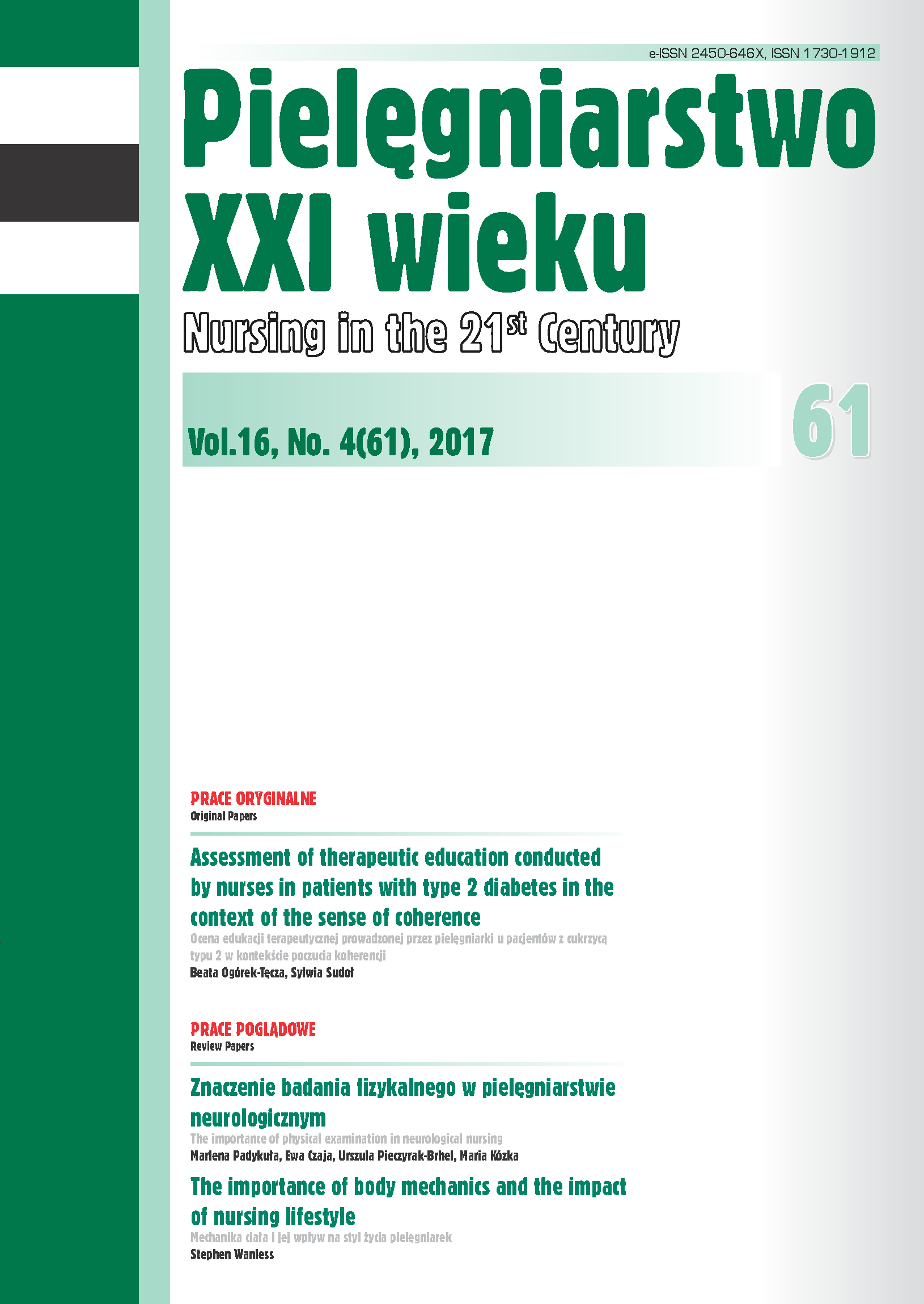Assessment of therapeutic education conducted by nurses in patients with type 2 diabetes in the context of the sense of coherence
DOI:
https://doi.org/10.1515/pielxxiw-2017-0035Keywords:
patient’s health education, type 2 diabetes, nurse, sense of coherenceAbstract
ASSESSMENT OF THERAPEUTIC EDUCATION CONDUCTED BY NURSES IN PATIENTS WITH TYPE 2 DIABETES IN THE CONTEXT OF THE SENSE OF COHERENCE
Aim. Assessment of the effectiveness of therapeutic education conducted by nurses working in the internal medicine wards in patients with diagnosed type 2 diabetes in the context of the sense of coherence.
Material and methods. The survey was carried out among 100 nurses working in the internal medicine wards. In the assessment of the effectiveness of therapeutic education, the authors’ survey questionnaire was used, whereas the sense of coherence of the surveyed nurses was measured by means of SOC-29 life orientation questionnaire.
Results. Therapeutic education conducted by nurses who completed postgraduate studies was a more planned process and covered more topics. A high sense of coherence correlates with a wider range of educational interactions. Over half of the surveyed nurses (56%) showed an average sense of coherence and 44% - a high sense of coherence, what was significant for the effectiveness of conducted health education. The number of encountered factors hindering the education of patients depends on the level of the sense of coherence. The surveyed with a high sense of coherence face more difficulties than those with an average sense of coherence.
Conclusions. The nurses declaring the implementation of therapeutic education of patients used the knowledge gained during postgraduate education. Those who completed such studies covered a wider range of topics during the education process. A high sense of coherence is an important factor, significant in the implementation of the educational function of the nurse, and the improvement of the effectiveness of this kind of education can be achieved thanks to wider consideration of these issues at universities and postgraduate education.
References
1. Woynarowska B. Edukacja zdrowotna. Warszawa: Wyd. PWN; 2010.
2. Dębska G, Rogala-Pawelczyk G, Zięba E. Projekt edukacji chorego z zespołem stopy cukrzycowej opartej na teorii Dorothy Orem. Piel. Zdr. Pub. 2012; 2 (1):57-65.
3. Van Damme-Ostapowicz K, Krajewska-Kułak E. Standard edukacji pielęgniarskiej wobec pacjentów z zakresu medycyny podróży. Probl. Pielęg. 2013; 12 (1):1-6.
4. Chudiak A, Lomper K, Jankowska-Polańska B, Uchmanowicz I. Wpływ edukacji diabetologicznej na ocenę jakości życia chorych z cukrzycą typ 2. Probl. Pielęg. 2015; 23:1-5.
5. Kostrzewa-Zabłocka E, Kulesza B. Samokontrola, jako nieodłączna część leczenia cukrzycy, poprawy jakości życia i zdrowia oraz sposób na zapobieganie powikłaniom. Zdr. i dobrostan. 2014; 2:79-89.
6. Heszen I, Sęk H. Psychologia zdrowia. Warszawa: Wyd. PWN; 2008.
7. http://www.psychologia.net.pl/testy.php?test=soc [Data dostępu 03.04.2017]
8. Lewtak K, Poznańska A. Uwarunkowania prowadzenia edukacji zdrowotnej pacjentów przez lekarzy podstawowej opieki zdrowotnej. Prz. Epidemiol. 2012; 66:697-704.
9. Raczyńska G, Jędrzejkiewicz B, Sykut A, Dobrowolska B. Udział pielęgniarki w działaniach edukacyjnych podnoszących poziom świadomości pacjentów na temat profilaktyki raka jelita grubego. J. Educ. Health and Sport. 2016; 6(11):195-204
10. Pabiś M, Ślusarska B, Jarosz M, Zarzycka D. i wsp. Kompetencje pielęgniarek w zakresie edukacji zdrowotnej w polskim systemie opieki medycznej. Piel. XXI wieku, 2010; 3-4: 32-33.
11. Polskie Towarzystwo Diabetologiczne. Zalecenia kliniczne dotyczące postępowania u chorych na cukrzycę 2016. Diabetol. Kliniczna. 2016; Supl. A:1-84.
12. Łapińska M, Gaworska-Krzemińska A, Dominiak K, i wsp. Poczucie koherencji a odporność na stres wśród położnych jako predyktory samodzielności zawodowej. Probl. Pielęg. 2013; 21(3):306-317.
13. Kurowska K, Maciaszek A, Haor B, Rezmerska L. Poczucie koherencji a wypalenie u czynnych zawodowo pielęgniarek. Piel. Chir. Angiolog. 2011; 1:23-30.
14. Zaczyk I. Occupational burnout and the sense of coherence among pediatric nurses. Zdr. Publ. 2010; 120 (4):417-420
15. Basińska M, Andruszkiewicz A, Grabowska M. Nurses’ sense of coherence and their work related patterns of behavior. J. Occup. Environ. Med. 2011; 24 (3):256-266.
16. Kocięcka A, Andruszkiewicz A, Wrońska I. Poczucie koherencji a stan zdrowia pielęgniarek czynnych zawodowo. Probl. Pielęg. 2010; 18 (2):139-144.
Published
Issue
Section
License
Copyright (c) 2017 Authors

This work is licensed under a Creative Commons Attribution-NonCommercial-NoDerivatives 3.0 Unported License.




